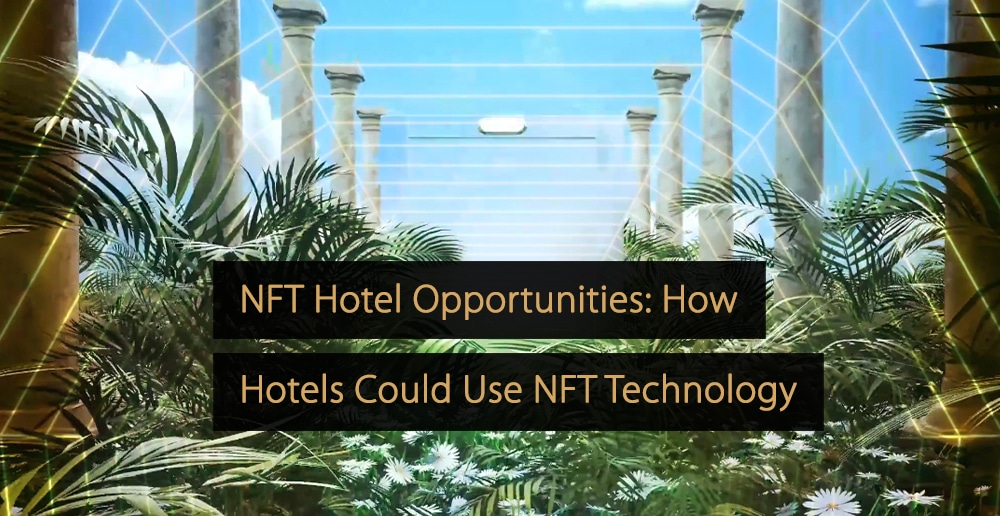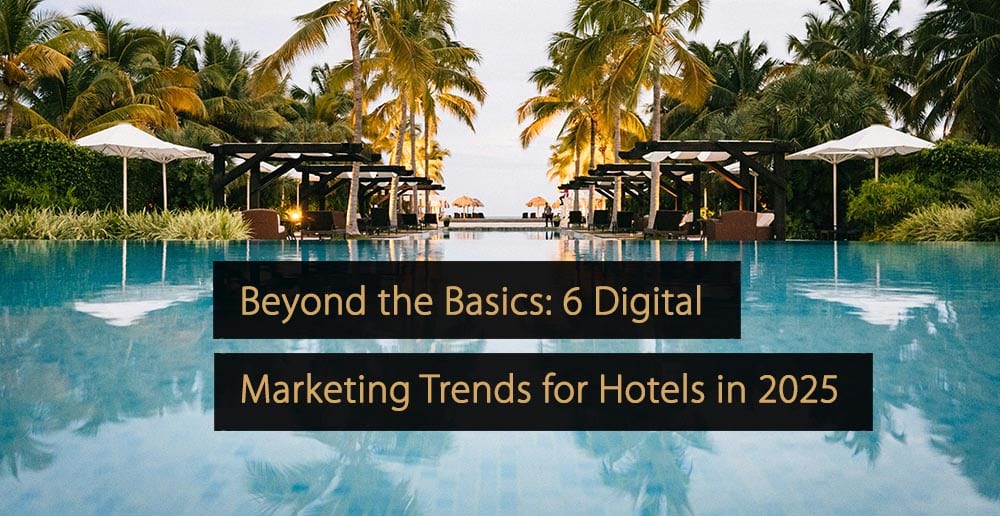The concept of a non-fungible token, or NFT, is still relatively new, and brands are exploring the various ways they can capitalize on this trend. In this article, you can find out about some of the existing NFT hotel offerings, along with some of the ways NFT technology will likely be used by hotels in the future.
Table of Contents:
- What is a Non-Fungible Token (NFT)?
- NFT Hotel Opportunities as a Part of the Metaverse
- Reasons for Leveraging NFTs for Marketing
- Examples of NFT Hotel Marketing Opportunities
- Example: Marriott International NFT Hotel Marketing Strategy
- NFT Hotel Marketing: Blockchain Technology and Its Uses in Hospitality
- NFT Hotel Opportunities and Emerging Hotel Technology Trends
What is a Non-Fungible Token (NFT)?
A non-fungible token, or NFT for short, is a cryptographic asset, which cannot be replicated, and which provides a user with a proof of ownership of a unique digital asset, such as an image, an audio file, or a video. NFTs are recorded using blockchain technology, ensuring that each item is one of a kind and can be verified as genuine.
The fact that an NFT is a unique construction offers several advantages for owners and content creators alike. The most significant benefit is using digital files similar to physical assets. So, for example, a buyer could own an original piece of artwork, and that artwork could be sold to them in digital form.
A non-fungible token differs from a fungible cryptocurrency because it cannot be traded or exchanged equivalently. While one Bitcoin can be traded for another, each NFT is unique. The growing popularity of NFTs has encouraged businesses to explore opportunities, including NFT hotel offerings.
Video: What is an NFT?
NFT Hotel Opportunities as a Part of the Metaverse
The metaverse refers to the creation of digital worlds, where meaningful social interactions can take place, and aside from virtual and augmented reality, blockchain technology plays a major role. While this most commonly refers to cryptocurrency like Bitcoin, it also includes the Ethereum blockchain and, increasingly, NFTs.
In this context, NFT hotel opportunities become possible, as long as hotels offer digital items that have real value in these virtual worlds. This could include game items, such as cosmetic items for an in-game avatar, digital images, music files, video content, and even property or land sold within the virtual worlds.
To learn more about the NFT hotel opportunities available to hotels, and how the metaverse is becoming a reality within the industry, read “How Can the Hotel Industry Take Advantage of the Metaverse?”.
Reasons for Leveraging NFTs for Marketing
NFT hotel opportunities are growing and offer marketing professionals a new and unique way to reach their target audience while also serving as a supplementary revenue source for those in the hotel industry.
In truth, the non-fungible token hotel marketing options are almost endless. For example, those working in hotel management positions can sell unique artwork, offer exclusive digital content, offer digital souvenirs, or enhance the virtual reality tours and virtual reality spaces they already provide.
Alternatively, hotels could partner with third parties, including local artists or larger business partners. Aside from providing a target audience with something tangible and unique to hold on to, NFTs can help hotels to build new relationships, expand brand awareness, and improve financial outcomes.
Examples of NFT Hotel Marketing Opportunities
With an understanding of how NFT hotel marketing strategies could work, it is worth going a step further and exploring some realistic examples of how NFT technology can be utilized in practice.
NFT Opportunities Within Virtual Worlds and Games
Video games and the creation of virtual worlds that can be explored using an avatar form an important part of the metaverse, and this technology can provide the ideal platform for exploring NFT hotel marketing techniques. For example, cosmetic items for a user’s avatar could be made entirely unique and sold as NFTs.
However, another option, which may be more relevant for hotel marketing, is the opportunity to sell digital real estate. In a virtual world, this could mean selling a plot of digital land as an NFT, selling a property, such as a virtual house, or even a virtual business, like a non-fungible token hotel. Regardless of what is sold, it can also be branded to enhance its value as a marketing tool.
Partnerships and Collaborations with Digital Artists
NFTs are most strongly associated with selling digital art, including photographs, 3D art, videos, animations, music, digital sketches, and more. With this in mind, one of the most interesting hotel marketing strategies to explore involves partnering with digital artists in mutually beneficial ways.
This could involve working with a local artist, to create NFTs for your hotel’s target audience. Both the artist and your hotel gain exposure, and the artwork can be designed to connect to your brand. Alternatively, your hotel might enter into a working partnership with an established artist, or musician. You pay them for their work and then sell it to customers as exclusive NFTs.
Example: Marriott International NFT Hotel Marketing Strategy
Marriott International became one of the first brands to think of NFTs and the blockchain as valuable hotel technology. The hotel company entered into a partnership with TXREK, JVY, and Erick Nicolay, who are all digital artists, to create unique digital images, which owners would be able to say were original artworks.
This partnership helped to connect the artists to the hotel brand by capitalizing on an existing marketing campaign entitled ‘The Power of Travel’. Using this as the theme, each artist created a piece of digital work that reflected their experiences with travel and its impact on them.
The resulting artwork was then showcased at the Art Basel Miami Beach 2021 event, with three attendees selected as the prize winners. These individuals were then given unique digital assets to keep. This allowed Marriott to have a presence at the event, the artists to showcase their work, and the prize winners to leave with something tangible.
NFT Hotel Marketing: Blockchain Technology and Its Uses in Hospitality
NFT hotel marketing opportunities are one way the hospitality industry can utilize blockchain technology. However, blockchain can also facilitate secure payments, authenticate identifications, power baggage tracking, and provide the foundation for customer loyalty programs.
To learn more about how blockchain technology can be used in all of these cases and explore the underlying technology itself, read the “Blockchain Technology and Its Uses in the Hospitality Industry“ article.
NFT Hotel Opportunities and Emerging Hotel Technology Trends
NFT hotel offerings are an example of the way in which hotel brands are capitalizing on new technology. However, for hotels to make the most of all of the technology at their disposal, they need to keep up with the latest trends. This means investing in the right technology and understanding how it can be used to the greatest effect.
To explore more about the latest technology and innovations, from chatbots and virtual reality all the way to the use of dedicated hotel robots, read “Hotel Technology Trends: 14 Upcoming Innovations You Must Know”.
Non-fungible tokens are among the biggest technology and marketing trends across various industries, and hotels are waking up to the potential on offer. NFT hotel marketing campaigns have the power to provide customers with something tangible while allowing hotels to achieve marketing goals and make additional income.
More Tips to Grow Your Business
Revfine.com is the leading knowledge platform for the hospitality and travel industry. Professionals use our insights, strategies, and actionable tips to get inspired, optimize revenue, innovate processes, and improve customer experience.Explore expert advice on management, marketing, revenue management, operations, software, and technology in our dedicated Hotel, Hospitality, and Travel & Tourism categories.
This article is written by:
Hi, I am Martijn Barten, founder of Revfine.com. With 20 years of experience in the hospitality industry, I specialize in optimizing revenue by combining revenue management with marketing strategies. I have successfully developed, implemented, and managed revenue management and marketing strategies for individual properties and multi-property portfolios.









Here you find an example of how hotels can use NFTs.